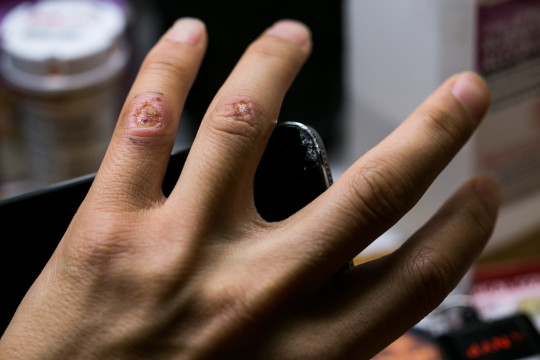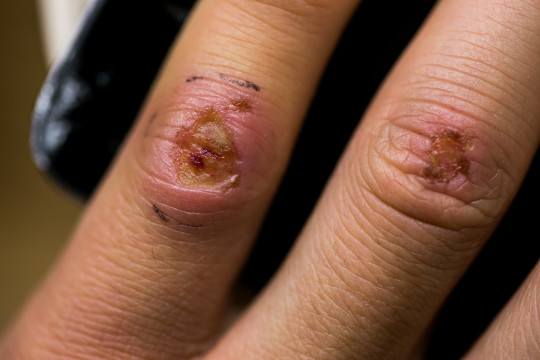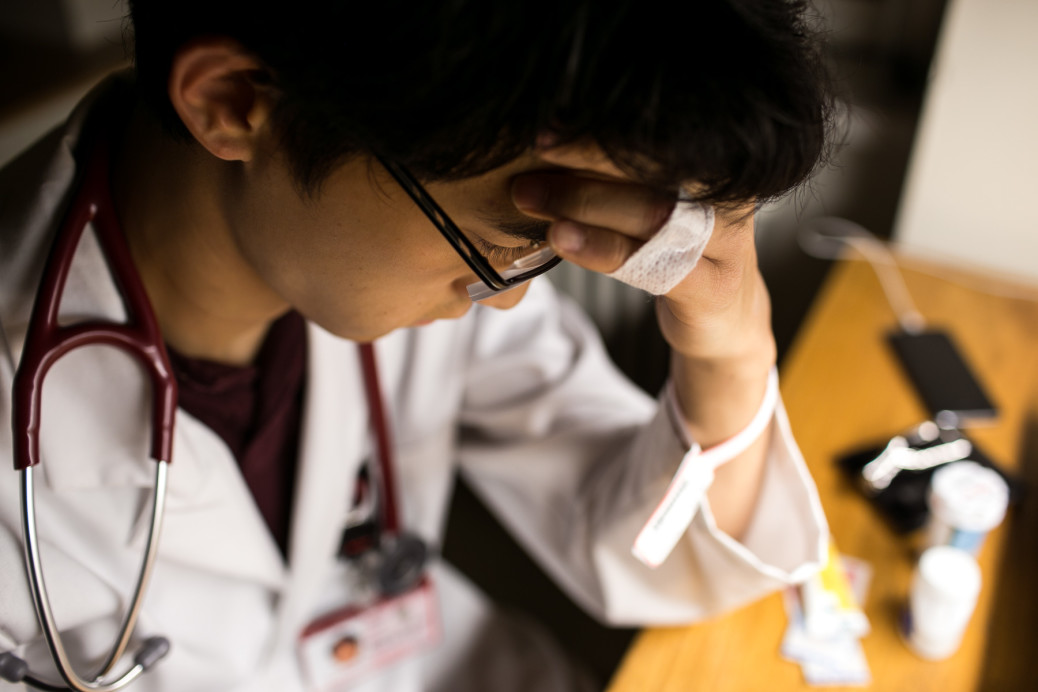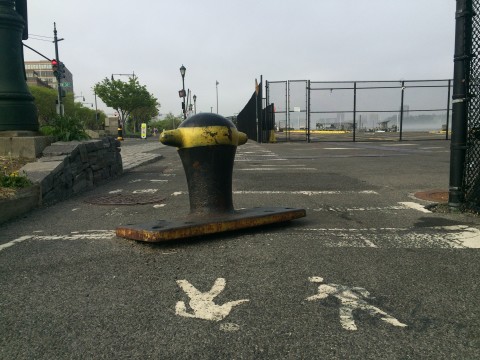Call me a wimp, but a flesh wound to my left pinky has crippled me for an entire week and counting.
The story is the opposite of dramatic. Here, let me recount it in the style of a medical history.
24 y/o male presents with severe hand pain status post injury to left fourth and fifth digits. 4 days prior, patient tripped while running and scraped backs of proximal interphalangeal joints of left 4th and 5th digits. He has been treating with washing and topical antibiotics, but the wound on the 5th digit has not healed properly and is painful, significantly inflamed, and with markedly reduced range of motion.
This was from when I actually checked into Urgent Care after my pinky had clearly become infected. And those were exactly the words I said to the attending physician who interviewed me.
Social History: medical student here at Cornell. He is right-handed, but is pianist/violinist.
I remember him relax a little when I said I was right-handed, but then he winced when he heard about the music. He said, “oh, then this finger is really important, isn’t it?”
Plan: x-ray to check for fracture, dislocation. Prescribe oral antibiotics for cellulitis.
I was pretty sure it wasn’t fractured, but reassurance was nice. In lieu of a physical exam, there are pictures at the end. Don’t worry, it’s not bad.
What has it been like? Well, if Weill Cornell really wants us to connect with our patients, they should have us become a patient ourselves. If for nothing else, we should get injured for the intensity and severity of the emotions.
The fall itself was over in a flash. I don’t even remember what tripped me or how I remembered to roll. An instant later, nothing actually “hurt”, but I felt the wounds on my two fingers, forearm, and knee. Then, the rush of terror. Oh no, my phone is cracked. Oh no oh no oh no, my fingers. I screwed up. Is it going to heal? Did the phalanges fracture? Am I going to be able to rehearse violin? I want to cry. Can the pinky still move? Oh, that’s blood pouring out of the tiny finger like a waterfall. Panic. All I want to do is go back and get help. But I’m more than 4 miles away. I screwed up.
I basically spent this entire week constantly cradling my hand. All that time was warped and clouded by my concern and frustration with my finger. Any mere brush against a finger would ignite every pain fiber on the finger and elicit a cowardly yelp. My fingers couldn’t type fast enough to keep up in lecture, and I slept through them anyway trying to get over the mounting infection. I couldn’t occupy myself by playing piano or violin, and I was getting increasingly desperate about having enough time to practice. Every morning, I woke up hoping that the skin would mend and the swelling would go down. Every night, I would spent hours just inspecting my pinky and lost in hypotheticals, thinking about how I had tried caring for it and how it could have done it better.
The ability to sympathize with patients is such a vital skill for doctors, and I thought that Cornell was doing a fairly good job teaching us that. Cornell brings in patients to talk about their experiences in coping with their illnesses. I quite enjoy those presentations because they tell their fascinating stories so well. Unfortunately, Cornell brings in eloquent patients who are succeeding against their illnesses. They have the composure to look back in retrospect and tell their narrative with a level head. Even if a patient comes in and says nothing but “I am going to die because of this disease and shit sucks”, it won’t affect us med students if we erect emotional barriers. I think the best way to break those barriers down is to acknowledge that anyone can be a patient. Our friends, our family, ourselves. Anyone can fall ill. We med students should remember that.
I am so guilty of having removed myself emotionally from my patients. After all, I worked a year with continuous glucose monitors but never wore one myself? I’ve pricked hundreds of fingers but almost never let anyone prick me. I fabricate excuses, that because I play piano and violin I should spare my own fingers. Ha. The irony.
I didn’t realize until now that I didn’t know how to pick up medications at a pharmacy. This was the first time I’ve had to deal with billing by myself too. And taking meds is hard! QID, four times a day, is way too often. It’s not simply when waking up, after lunch, after dinner, and before bed. In reality, it’s more like as I’m rushing out the door to class, or in the middle of my volunteer shift, or when I thought I was going to take it but got interrupted and forgot.
Meanwhile, physicians are prescribing countless patients are juggling regimens of 7 or more different medications. With different requirements like on empty stomach, rest after taking, every other day, etc.. How can doctors tell patients to do something like that and expect them to keep up? Polypharmacy is a huge problem in the US. I don’t remember the specific statistics from our lecture, but something ridiculous like 40% of older adults are prescribed 4 or more medications. Compliance also drops to around 10% once they are prescribed 4 or more medications. And whose fault is that, really? The root of the problem is not medical literacy or a lack of effort by the patients. It’s that physicians forget how difficult for anyone to follow a complicated medical regimen. Cornell did their best to impress that upon us, even having us do a polypharmacy simulation exercise. Still, “oops I forgot to eat my pseudo-medicine candy” is not nearly the same as the threat of “if I don’t take my meds on schedule my finger will get infected and fall off” hanging over my head.
It’s difficult to admit right now, but I’m sooooo lucky. When I fell, I could have messed up my roll and broken my wrist or damaged my knees badly. Or worse. Falling is one of the greatest risks for permanently incapacitating the elderly. What is it we learned in lecture today, falling has 20% all-cause mortality at one year?
During a few short stints in the ER this year, I have accumulated many vivid mental images of old patients who arrived having fallen. They’re not pretty sights. Splotchy bruises more than a foot across. So many bloody faces with knocked out teeth and cut lips and broken noses. Wrists broken to gruesome angles. Ankles swollen with the skin so taught it looks like it’ll burst like a balloon. A bulla on a knee, which was basically a blister on the knee the size of… the entire knee.
Instead, my legs are fine and I’ll run the half marathon this month, and my fingers will heal in time to perform at graduation in Carnegie in a few weeks. I felt like such a fraud sitting there in Urgent Care, wearing my white coat with two bandaids on my hand.
Anyone can be a patient, including med students. Especially me. Necessarily me.
—
(pics below)


Edit: Two weeks later, I finally got the guts (and long-distance legs) to run back to where I tripped. Apparently this is what got me:

